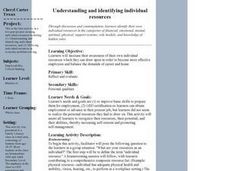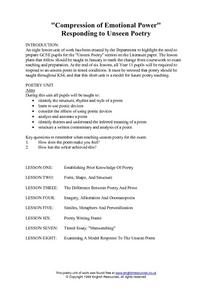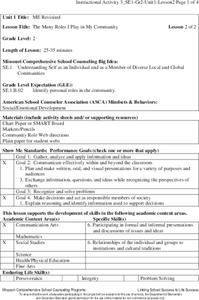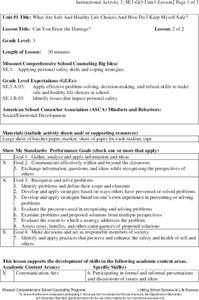Curated OER
How We Feel
Students examine how their feelings make them unique. They read and discuss a poem, develop a list of feelings, and create a drawing of them feeling happy and healthy.
Curated OER
Tell Me A Story -- Feelings
Practice using feelings as a way to reflect on past experiences. The poem The End and the text Tell Me a Story Mama are used to identify feeling words. As an extension, pupils participate in a service learning project and reflect upon...
Nebraska Department of Education
Stereotypes
Stereotyping leads to prejudice. That's the central concept in a lesson designed for eighth graders. After identifying the traits associated with different stereotypes, class members brainstorm actions they can take to stop stereotyping.
Curated OER
Emotions in Motion
Young scholars use dance as a form of communication. In this meanings of dance lesson, students create dances to communicate a variety of emotions.
Curated OER
Understanding and Identifying Individual Resources
Students identify their own individual resources in the categories of financial, emotional, mental, physical, role models, knowledge of hidden rules, and support systems.
Curated OER
The Human Organism
Students identify their feelings and learn constructive ways of handling conflict. In this feelings and conflict instructional activity, students read a story about conflict and identify ways to understand emotions and resolve conflict.
Curated OER
"Compression of Emotional Power"--Responding To Unseen Poetry
Eleventh graders identify the structure, rhythm and style of a selected poem, experience utilizing poetic devices and analyze an annotated poem. They evaluate the themes and inferred meanings to a variety of poems from their textbooks.
Curated OER
ESL Vocabulary Connect the Dots: Feeling
In these English Language vocabulary worksheets, students use the pictures to help them identify the feeling words. Students connect the dots from the pictures to their matching words. Students then trace the words and find the missing...
Missouri Department of Elementary
The Many Roles I Play in My Community
Small groups brainstorm their roles in the community. Then, individually, complete a community roles web worksheet. Peers share their completed product and extend the conversation to include the feelings and character traits that go...
Missouri Department of Elementary
Character Clovers
Build a classroom community with a lesson that uses character clovers to examine scholars' roles. Following a whole-class discussion, participants list four roles they play and accompany it with the character traits that go along with it.
Missouri Department of Elementary
Acting Out Respect and Compromise
Puppets showcase the importance of being a good friend. Following a discussion about positive character traits, scholars create a paper-bag puppet and role-play scenarios with a peer.
Missouri Department of Elementary
What Are Bullying and Harassment? Part 2
After reviewing notes from the previous lessons, small groups obtain a scenario card that describes a situation in which bullying is happening. Peers discuss the event and brainstorm two solutions using the STAR method then present their...
Missouri Department of Elementary
Can You Erase the Damage?
A pencil and an eraser bring forth the message that negative comments never truly disappear. On a large piece of paper, scholars list negative comments then attempt to replace them with kind ones. Pupils discuss the impact of negative...
Learning to Give
What Are Your Thoughts?
The varying responses of the characters in Mildred Taylor's Roll of Thunder, Hear My Cry to the discrimination they experience or perpetrate provides readers with an opportunity to not only examine the feelings of the characters but to...
Lions Clubs International Foundation
Mindful Self-Management Exercise: Self-Motivation
Encourage self-motivation with an activity that allows scholars to reflect on their challenges and set goals to better them. A script prompts pupils to listen to the Can-Do Coach inside them. An inspiring statement reminds participants...
Lions Clubs International Foundation
Mindful Self-Awareness Exercise: Recognizing Strengths
Learners think of something they're good at and reflect on how they feel about it. Pupils then think of ways to be even better at it and set a mental goal to practice.
Lions Clubs International Foundation
Mindful Self-Awareness Exercise: Accurate Self-Perception
Scholars think to themselves about what is something that they are good at and what makes them a good person. A prompt asks them to reflect on their feelings when they think of their positive attributes.
Overcoming Obstacles
Kindness
Encourage kindness with a lesson that defines kindness, asks scholars how to show kindness, and share how others have shown them kindness. Multiple activities prove that kindness is easy to give through coloring, storytelling, a game of...
Overcoming Obstacles
Having a Positive Attitude
Through discussion and reflection, scholars discover what it means to have a positive attitude, that an individual can choose to stay positive, and discuss the benefits of a positive attitude. Learners listen to negative scenarios to...
Overcoming Obstacles
Becoming a Good Friend
A instructional activity focuses on the qualities of a good friend. Scholars discuss how to be a good friend and decorate a hand cutout to represent a high five of friendship. Small groups offer encouragement and give compliments to each...
Overcoming Obstacles
Being Responsible
A lesson all about responsibility details the importance of building trust. Scholars discuss and create posters about responsibility and explore strategies to become more responsible. Peers work collaboratively to craft a rainbow of...
Overcoming Obstacles
Empathy
A lesson boosts relationship skills with a focus on empathy. Scholars define it, offer examples, and practice showing empathy with scenario cards. Five steps assist class members in empathizing in the classroom, home, and community.
Anti-Defamation League
Say Something: Discussion Guide for Grades 2-4
Empower pupils to stop bullying when they see or experience it with a activity that showcases the book, Say Something by Margaret Paula Moss. After reading the tale and thoughtfully discussing its characters, they share their own...
Anti-Defamation League
Nothing Wrong with a Three-Legged Dog: Discussion Guide for Grades 3-5
Scholars study the book, Nothing Wrong with a Three-Legged Dog by Graham McNamee to encourage an antibullying trend in their school and community. Chapters and themes examine bias, coping skills, how to respond to bullying, and being a...

























